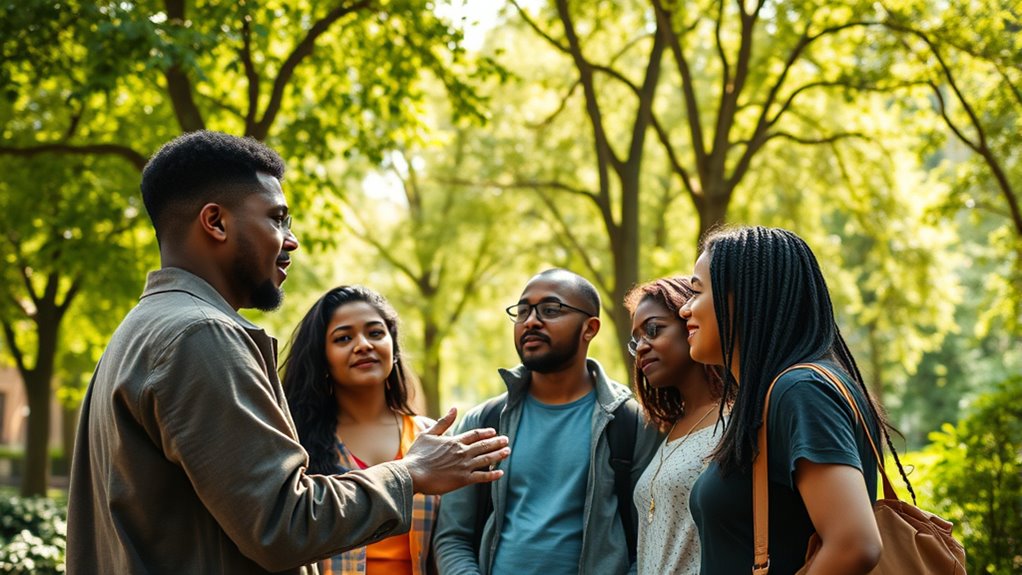Allyship 101 is about transforming awareness of social inequalities into meaningful actions that foster inclusion and challenge injustice. Start by understanding your privileges and biases, then actively listen to marginalized voices while promoting their stories. Speak out against discrimination and support equitable policies. Build long-term commitments through community engagement and consistent effort. If you stay committed and open, you’ll discover how to create lasting change and support others more effectively.
Key Takeaways
- Recognize and reflect on personal privileges and biases to inform genuine allyship.
- Actively listen to marginalized voices, amplifying their perspectives without speaking over them.
- Challenge injustices promptly and advocate for inclusive policies and practices.
- Set clear goals, take responsibility, and engage in ongoing community efforts for collective impact.
- Commit to sustained learning and community involvement to foster long-term, meaningful change.
Understanding the Foundations of Allyship
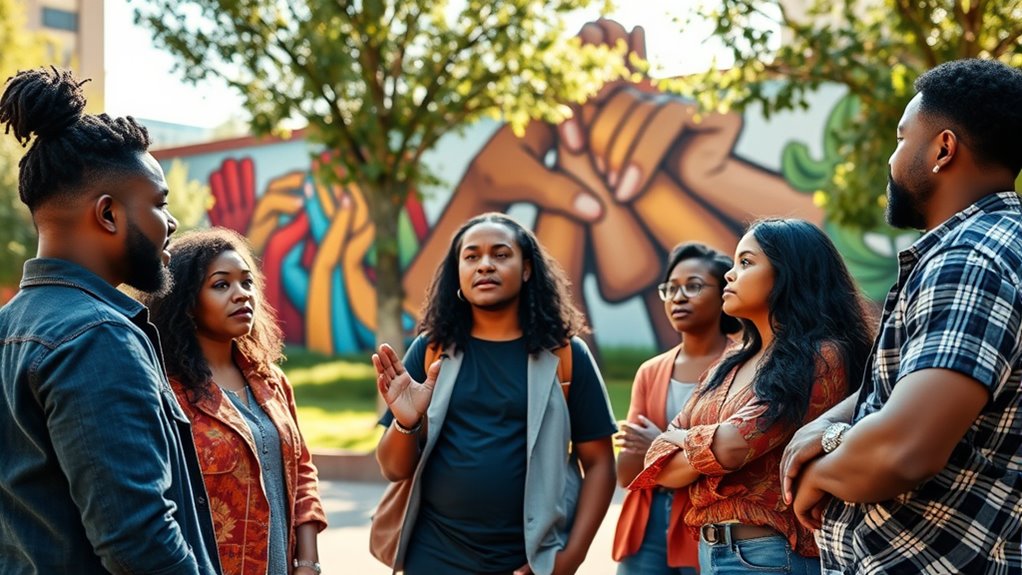
What exactly does it mean to be an ally? It starts with understanding cultural awareness—the ability to recognize and respect different backgrounds, experiences, and identities. This awareness helps you see the world through others’ perspectives, fostering empathy. Equally important is grasping the historical context behind social issues. Knowing the history behind systemic inequalities, discrimination, and marginalization helps you appreciate why certain groups face ongoing challenges. Being an ally isn’t just about good intentions; it’s rooted in knowledge and understanding. When you combine cultural awareness with an understanding of history, you’re better equipped to support marginalized communities genuinely. This foundation encourages meaningful action rather than performative gestures, moving you closer to authentic allyship. Additionally, engaging in diverse outdoor environments can help broaden your perspective and deepen your understanding of different communities. Recognizing the importance of inclusive spaces allows you to foster environments where everyone feels valued and supported. Embracing cultural competence further enhances your ability to act effectively as an ally across diverse settings. Developing intercultural communication skills is also essential for bridging gaps and building trust with those from different backgrounds.
Recognizing Your Privileges and Biases
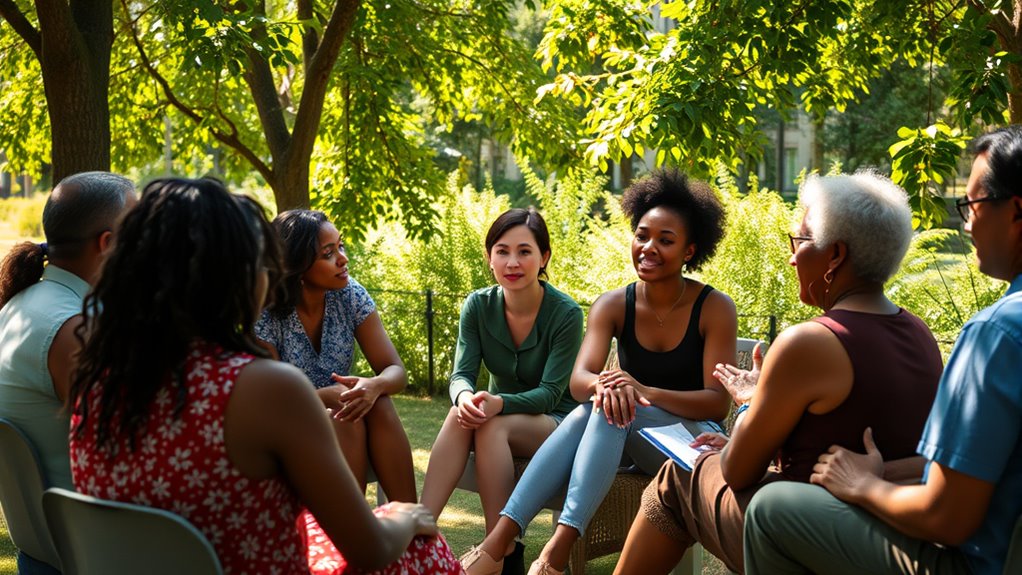
To be an effective ally, you need to recognize the privileges you hold and how they influence your perspective. Consider the biases you might not even realize you have and how they shape your interactions. Reflecting on your social conditioning helps you understand why certain beliefs and behaviors exist, enabling you to grow as an ally. Engaging in self-awareness through reflection can deepen your understanding of your own biases and strengthen your capacity to support others. Exploring cultural awareness can further enhance your ability to empathize with diverse experiences and backgrounds. Participating in remote hackathons can also provide insight into the diverse perspectives and collaborative skills needed to foster inclusion and innovation in various environments. Developing an understanding of AI ethics and its implications can also contribute to a broader perspective on societal fairness and justice.
Identifying Personal Privileges
Recognizing your privileges requires honest reflection on the unearned advantages you may have based on your identity. To do this effectively, engage in personal reflection, honestly evaluating how your background, race, gender, or socioeconomic status has benefited you. Privilege awareness isn’t about guilt but understanding your position so you can better support others. Take time to identify moments where your circumstances gave you an edge, whether in education, employment, or social interactions. Being aware of Fokos and their features can serve as a metaphor for uncovering hidden privileges, as some may have easier access or more opportunities to enjoy leisure activities. Acknowledging these privileges helps you see the system’s impact and prepares you to be a more effective ally. Remember, this process is ongoing — the more you reflect, the clearer your understanding becomes, empowering you to move from awareness to meaningful action.
Uncovering Hidden Biases
Building on your awareness of personal privileges, it’s important to also uncover hidden biases that influence your perceptions and actions. Implicit stereotypes and subconscious prejudices often operate without your awareness, shaping judgments and behaviors. To identify these biases, consider reflecting on moments where you reacted instinctively or made assumptions without clear reasoning. You can also question your automatic thoughts about different groups or individuals. Engaging in activities that reveal Implicit stereotypes can help uncover biases you might not recognize consciously.
- Notice patterns in your reactions and judgments
- Challenge stereotypes that come to mind automatically
- Seek feedback from others on your biases
- Engage in training or activities that reveal implicit stereotypes
- Be mindful of how unconscious biases impact your interactions and decisions
Recognizing these hidden biases is a pivotal step toward becoming a more conscious and effective ally. It opens the door to intentional actions rooted in fairness and empathy.
Reflecting on Social Conditioning
Understanding how social conditioning shapes your beliefs and behaviors is essential to becoming a more effective ally. Social conditioning influences how you perceive others and can embed implicit biases that you might not even realize. Reflecting on these influences helps you recognize the privileges you hold and the stereotypes you’ve absorbed. By examining your own social conditioning, you can identify areas where biases may unconsciously affect your actions or judgments. This awareness allows you to challenge ingrained assumptions and actively work toward more equitable behaviors. Recognizing implicit biases is a pivotal step in moving from passive awareness to meaningful allyship. When you understand the roots of your beliefs, you’re better equipped to foster genuine empathy and support social change. Additionally, exploring the impact of social conditioning on mental health can deepen your understanding of how societal influences affect emotional well-being. Engaging in self-reflection about these influences can help uncover hidden biases and foster personal growth. Recognizing how social conditioning contributes to stereotypes can further enhance your ability to challenge harmful narratives. Moreover, understanding the role of societal influences in shaping perceptions can improve your capacity for empathetic engagement in diverse contexts.
Listening and Learning From Marginalized Voices
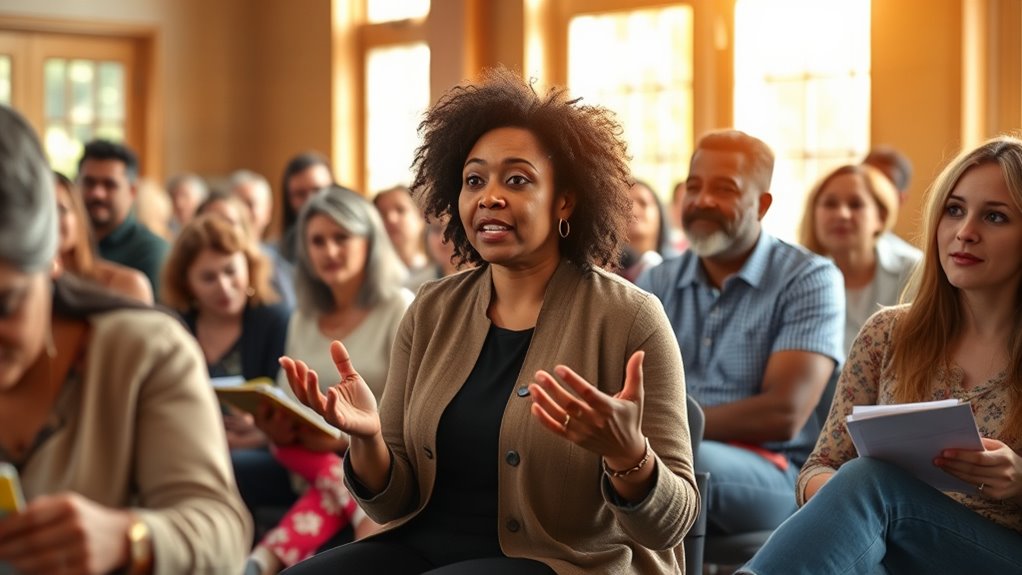
To be an effective ally, you need to practice active listening techniques that truly hear marginalized voices. By paying close attention and asking thoughtful questions, you show that you value their experiences. Remember, amplifying these voices helps create a more inclusive and understanding environment for everyone. Incorporating listening techniques rooted in empathy can significantly deepen your understanding of the issues faced by marginalized groups. Additionally, understanding the importance of high-quality equipment and proper setup, as emphasized in sound recording techniques, can help ensure that marginalized voices are accurately and respectfully represented in various media. Using mindfulness practices during conversations can also enhance your ability to remain present and receptive, fostering a more supportive dialogue. Regularly reviewing cookie policies can also enhance transparency and trust with the communities you aim to support.
Active Listening Techniques
Active listening is essential when engaging with marginalized voices because it demonstrates respect and a genuine desire to learn. To practice effective active listening, focus on empathy exercises and observe non-verbal cues, which reveal unspoken feelings. You can enhance your skills by:
- Maintaining eye contact and open body language
- Nodding and using facial expressions to show understanding
- Asking clarifying questions to ensure comprehension
- Reflecting back what you hear to confirm accuracy
These techniques help create a safe space for sharing and deepen your understanding. Avoid interrupting or dismissing feelings; instead, stay attentive and patient. By consciously applying these active listening techniques, you foster trust and demonstrate authentic allyship, empowering marginalized voices to be heard and validated.
Amplifying Marginalized Voices
Building on your active listening skills, amplifying marginalized voices requires intentionally prioritizing their perspectives and experiences. You must create space for these voices to be heard, fostering genuine cultural appreciation rather than superficial allyship. Be aware of allyship pitfalls, such as speaking over others or assuming you fully understand their experiences. Instead, focus on listening without judgment, asking thoughtful questions, and amplifying their messages when appropriate. Recognize that true allyship involves ongoing learning and humility. By elevating marginalized voices, you help dismantle barriers and promote authentic inclusion. Remember, your role isn’t to speak for them but to support and highlight their stories, ensuring their experiences are acknowledged and valued in the broader conversation.
Educating Yourself and Others
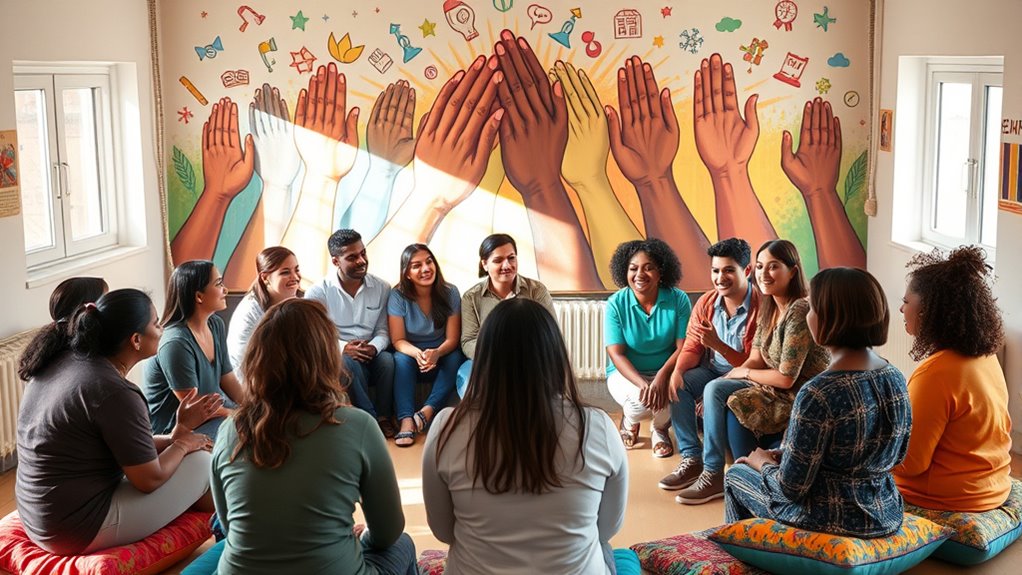
Educating yourself and others is a vital step in becoming an effective ally. By increasing your cultural awareness, you better understand the experiences and struggles of marginalized groups. This knowledge helps you develop stronger allyship strategies. To deepen your understanding, consider:
Educate yourself and others to build authentic connections and strengthen your allyship efforts.
- Reading books, articles, and research on different cultures and social issues
- Attending workshops or webinars focused on cultural awareness and allyship
- Listening to stories and perspectives from marginalized communities
- Sharing what you learn to inform and inspire others
This proactive approach guarantees you’re not just aware but actively growing your understanding. Educating yourself allows you to build authentic connections and advocate effectively. Remember, allyship is a continuous process of learning and sharing knowledge.
Speaking Up and Challenging Injustice
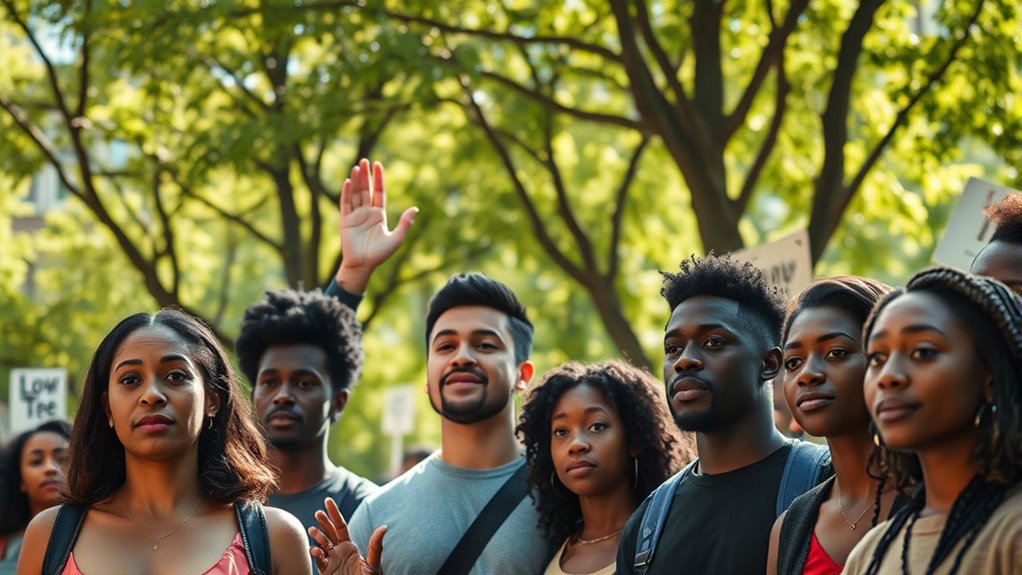
When you see injustice happening, it’s essential to recognize it immediately and speak up without hesitation. Your voice can challenge unfairness and make a real difference in creating change. Don’t hold back—boldly stand up for what’s right.
Recognize Injustice Quickly
How quickly can you recognize injustice around you? Being attentive is essential. Cultivating microaggressions awareness helps you spot subtle biases that often go unnoticed. Developing cultural competence allows you to understand different perspectives, making you more sensitive to unfair treatment. When you observe something wrong, act swiftly—challenging injustice prevents it from escalating. Here are signs to watch for:
- Microaggressions or dismissive comments
- Unequal treatment or exclusion
- Disrespectful language or behavior
- Stereotypes reinforced unintentionally
Use Your Voice Boldly
Using your voice boldly means speaking up without hesitation when you witness injustice. Your voice amplification can inspire others to act and create a ripple effect of change. Speaking courage requires overcoming fear and trusting that your words matter. When you challenge harmful stereotypes or call out discrimination, you help dismantle oppressive systems. Don’t stay silent to avoid conflict; your silence can be interpreted as acceptance. Instead, stand firm and articulate your support clearly. Your willingness to speak up not only supports those affected but also reinforces your commitment to justice. Remember, brave voices inspire collective action, and every challenge to injustice counts. Use your voice boldly—your words can be a powerful tool for change.
Supporting Inclusive Policies and Practices
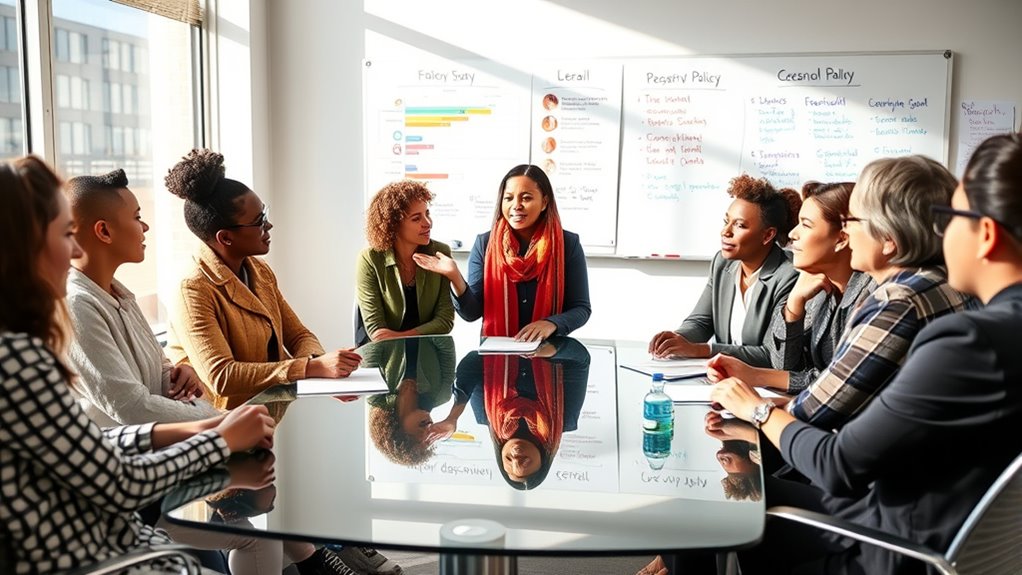
Supporting inclusive policies and practices is essential for creating a truly equitable environment. Your role as an ally involves advocating for corporate policies that promote workplace diversity and fairness. By pushing for transparent hiring procedures, equal opportunity initiatives, and anti-discrimination measures, you help foster an environment where everyone feels valued. You can also encourage leadership to review existing policies regularly to identify gaps and biases. Additionally, supporting employee resource groups and diversity training programs amplifies inclusion efforts. When you champion these practices, you contribute to a culture where diverse perspectives are respected and embraced. Ultimately, your active involvement helps turn awareness into tangible change, ensuring policies reflect a genuine commitment to equity for all.
Building Long-Term Commitments and Relationships
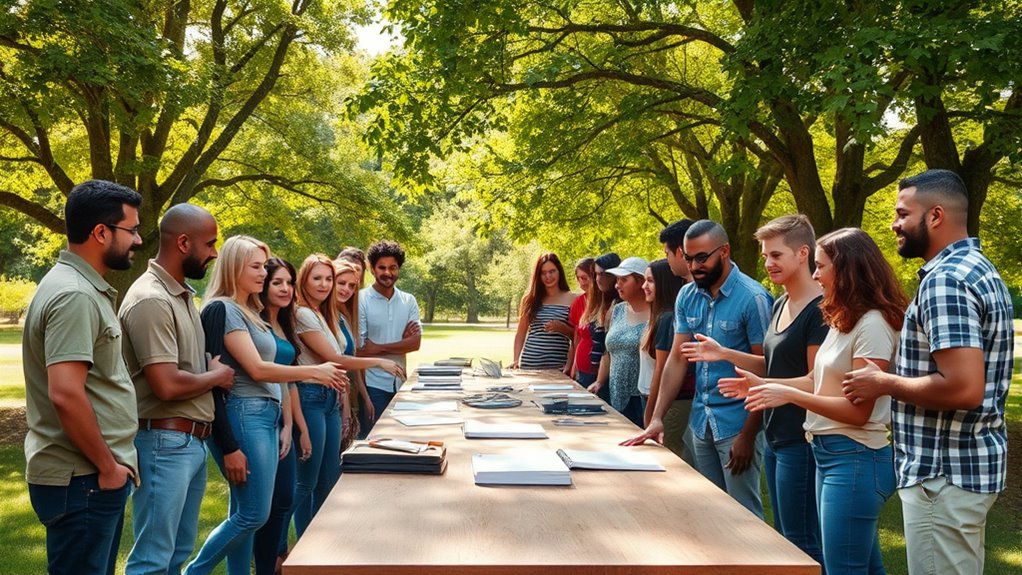
Building long-term commitments and relationships as an ally requires ongoing effort and genuine engagement. You must understand and navigate interpersonal dynamics, recognizing that trust and respect develop over time. Consistent actions, rather than one-off gestures, strengthen your role as an ally. Engage actively within communities, listening to their needs and respecting their voices. Building these relationships isn’t about performative allyship but about sustained involvement and support. Invest time and energy into understanding the broader context, showing your commitment beyond surface-level interactions. As you deepen these connections, your influence grows, fostering a more inclusive environment. Remember, authentic community engagement is key—your ongoing dedication helps solidify your role as a true ally committed to meaningful change.
Navigating Difficult Conversations With Compassion

Finding your way through difficult conversations with compassion requires you to stay present and empathetic, even when topics are uncomfortable or charged. To do this effectively, focus on active listening and practice empathy exercises to better understand the other person’s perspective. Keep conflict resolution techniques in mind, such as staying calm and avoiding blame. Remember, your goal is to foster understanding, not victory. Consider these strategies:
- Use reflective listening to confirm your understanding
- Acknowledge emotions without judgment
- Ask open-ended questions to clarify concerns
- Maintain a respectful tone, even if disagreements arise
Holding Yourself Accountable for Growth
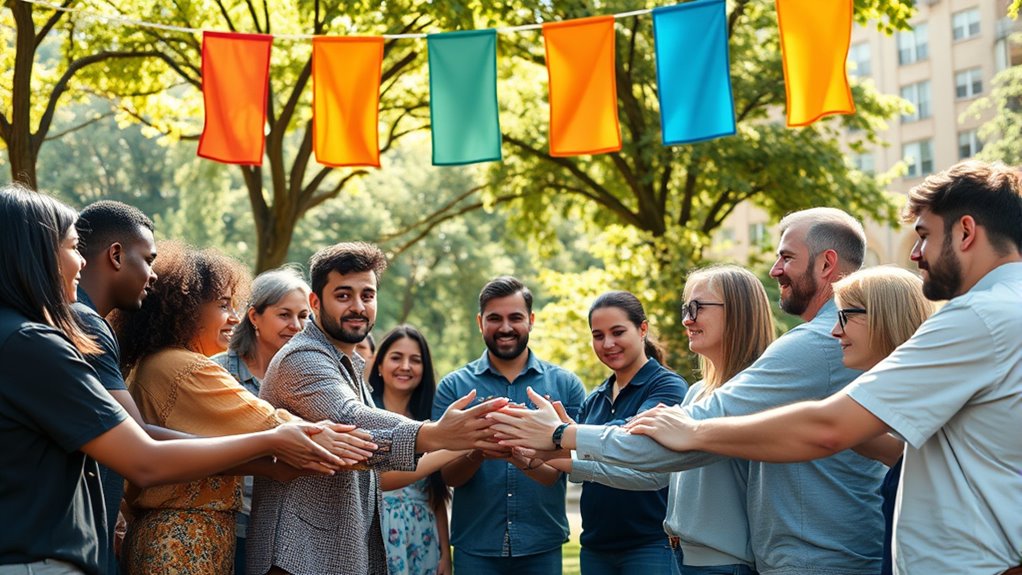
Consistently holding yourself accountable for growth is essential to becoming a genuine ally. Personal accountability means actively reflecting on your actions, acknowledging mistakes, and learning from them. Embracing a growth mindset allows you to see challenges as opportunities to improve rather than setbacks. To stay accountable, set clear goals for your allyship journey and regularly assess your progress. Seek feedback from others, especially those with different experiences, and remain open to change. Remember, growth isn’t linear—it requires ongoing effort and honesty. By taking responsibility for your development, you demonstrate genuine commitment and foster trust. Ultimately, accountability keeps you grounded, ensuring your actions align with your intentions to support and uplift others.
Inspiring Collective Action and Advocacy
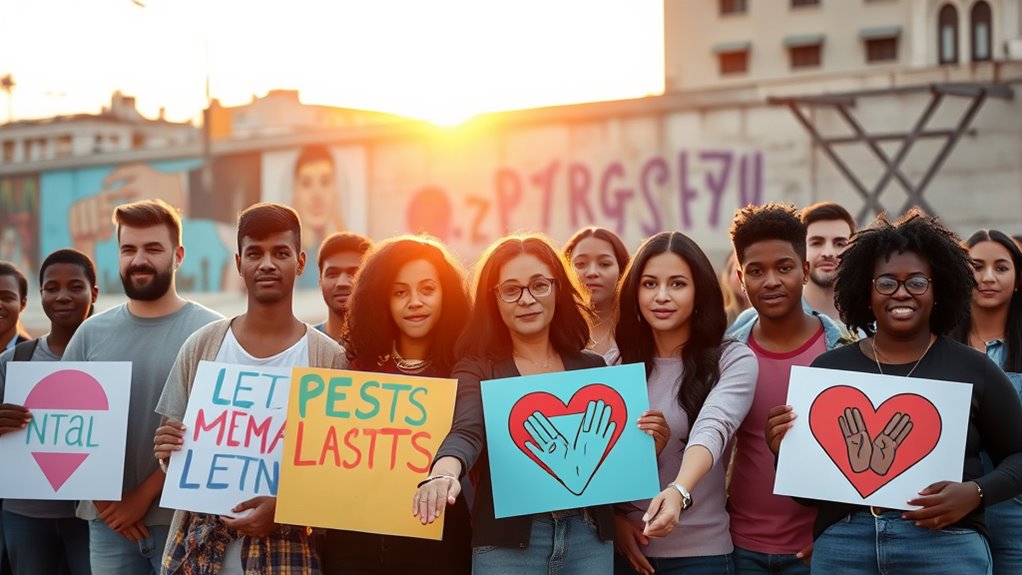
Have you considered how your individual actions can ignite broader change? Inspiring collective action and advocacy starts with small steps. You can engage in community outreach to connect with others who share your values, amplifying your impact. Participating in cultural celebrations helps raise awareness and foster understanding, uniting people around shared experiences. You might also organize events that highlight diverse voices, encouraging others to get involved. Supporting local initiatives and advocating for policy changes further strengthens your collective voice. By championing these efforts, you create momentum that extends beyond your actions. Remember, meaningful change happens when many come together—your leadership in fostering community outreach and cultural celebration can inspire others to join the movement.
Frequently Asked Questions
How Can Allies Effectively Prioritize Their Actions Without Overshadowing Marginalized Voices?
When you think about prioritization strategies, focus on amplifying marginalized voices without overshadowing them. Listen actively, learn from their experiences, and ask how you can support their priorities. Use your privilege to elevate their concerns rather than lead the conversation. By doing so, you guarantee your actions are impactful and respectful, fostering genuine allyship that centers marginalized voices and promotes meaningful change.
What Are Common Mistakes to Avoid When Practicing Allyship in Sensitive Situations?
You might think avoiding microaggressions is enough, but avoid performative allyship, which can do more harm than good. Don’t speak over marginalized voices or assume you know the full story; instead, listen actively and validate experiences. Be cautious in sensitive situations, avoiding silence or superficial gestures. Recognize your limits and seek ongoing education, ensuring your actions are genuine and supportive, not just for show.
How Do Allies Maintain Humility During Their Ongoing Learning Journey?
When you focus on maintaining humility during your ongoing learning journey, prioritize humility cultivation by recognizing that you’re always learning and can make mistakes. Stay receptive to feedback, understanding it as a gift that helps you grow. Avoid defensiveness, and instead, listen actively and reflect honestly. This approach keeps you grounded, open-minded, and committed to genuine allyship, fostering continuous improvement and deeper understanding.
What Strategies Help Sustain Long-Term Allyship Commitments Amid Challenges?
To sustain long-term allyship commitments, you focus on nurturing community resilience and practicing cultural humility. You stay engaged by listening actively, learning continuously, and supporting others authentically. You recognize setbacks as part of growth and remain adaptable. By fostering open dialogue, building trust, and embracing humility, you strengthen your resolve. These strategies help you navigate challenges while maintaining genuine, impactful allyship over time.
How Can Organizations Measure the Impact of Their Allyship Initiatives?
To measure your organization’s impact of allyship initiatives, focus on tracking employee engagement and diversity metrics. You should regularly gather feedback through surveys and analyze participation in inclusion programs. By monitoring changes in representation and engagement levels over time, you can assess progress and identify areas needing improvement. This data-driven approach helps you demonstrate the real effects of your efforts, ensuring your initiatives foster meaningful, lasting change.
Conclusion
Now that you understand how to move from awareness to action, it’s time to put your allyship into practice. Imagine speaking up when a colleague makes a biased comment, or supporting a community organization. By staying committed, listening actively, and challenging injustice, you create meaningful change. Remember, allyship is a journey, not a destination. Keep learning, growing, and advocating—your actions can inspire others and foster a more equitable world.
